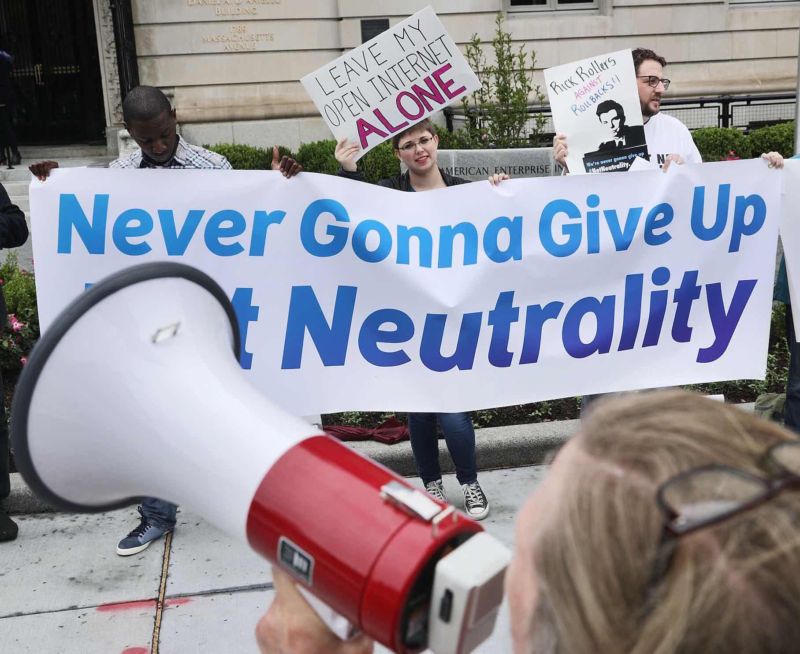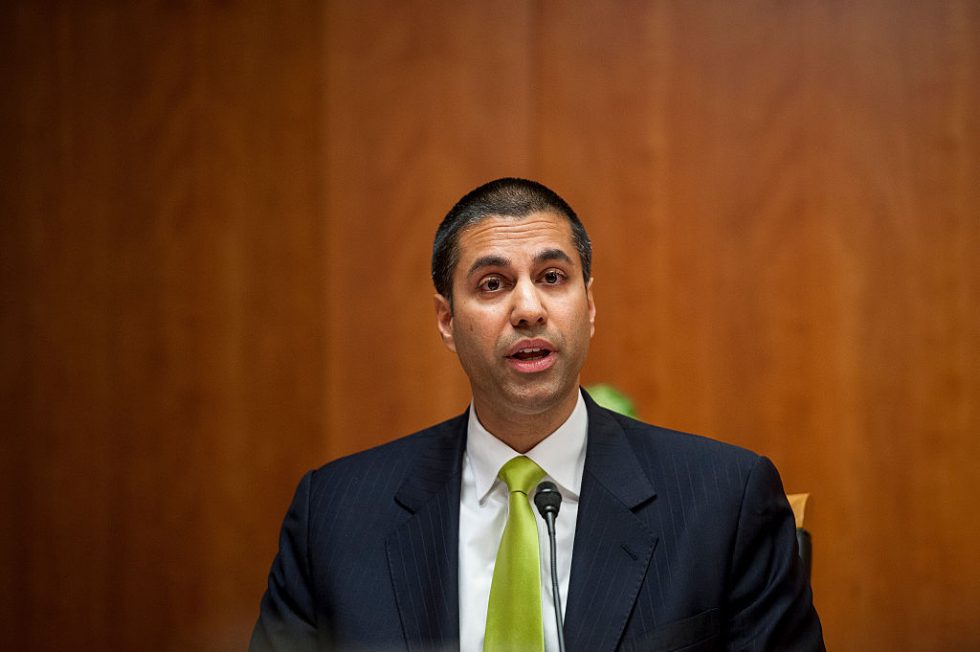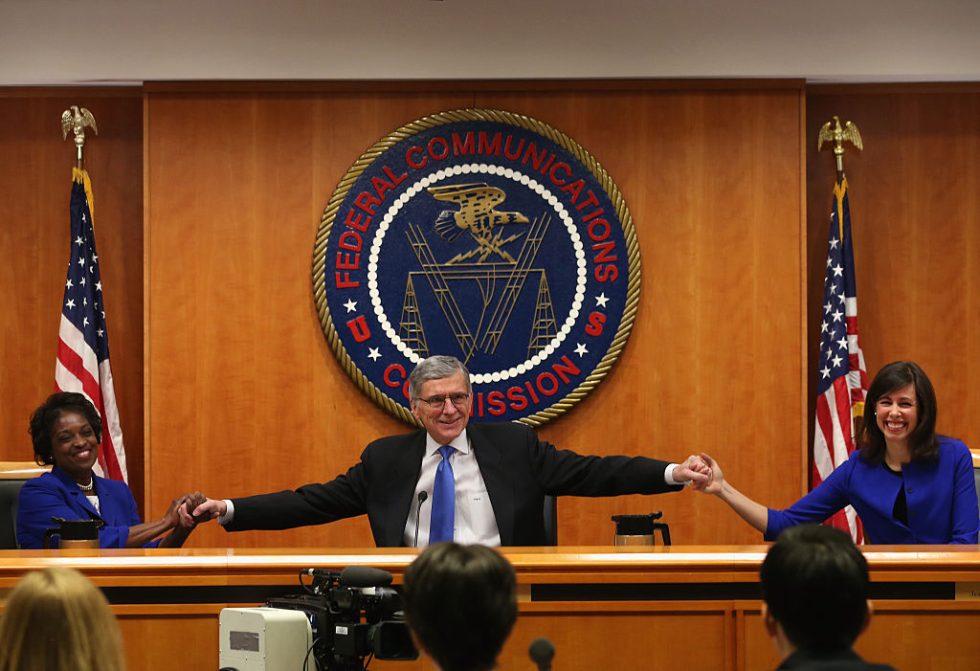
The US Federal Communications Commission voted 2-1 today to start the process of eliminating net neutrality rules and the classification of home and mobile Internet service providers as common carriers under Title II of the Communications Act.
The Notice of Proposed Rulemaking (NPRM) proposes eliminating the Title II classification and seeks comment on what, if anything, should replace the current net neutrality rules. But Chairman Ajit Pai is making no promises about reinstating the two-year-old net neutrality rules that forbid ISPs from blocking or throttling lawful Internet content or prioritizing content in exchange for payment. Pai's proposal argues that throttling websites and applications might somehow help Internet users.
The FCC plans to take comments on its plan until August 16 (the docket is available here) and then make a final decision sometime after that.
The net neutrality rules were approved in February 2015 when Republicans were in the commission's minority. Today, Pai and fellow Republican Michael O'Rielly voted in favor of the plan to eliminate the rules while Democrat Mignon Clyburn voted to preserve them.
"The Internet was not broken in 2015" before the rules were imposed, Pai said today before the vote. "We were not living in a digital dystopia. Nonetheless, the FCC that year succumbed to partisan pressure from the White House and changed course." The rules imposed new regulatory burdens on ISPs both large and small, he said. The Title II rules also raised "the possibility of broadband rate regulation," making ISPs hesitate before building or expanding networks, he said.
The fear of rate regulation on consumer broadband services is based on hypotheticals, because the FCC has not imposed any rate regulation on home or mobile broadband.
O'Rielly today said that he dissented from the net neutrality vote in 2015 "because I was not persuaded based on the record before us that there was evidence of harm to businesses or consumers that warranted the adoption of the net neutrality rules, much less the imposition of heavy-handed Title II regulation on broadband providers."
Pro-net neutrality group Free Press recently published an updated list of alleged net neutrality violations by ISPs through the years.
"This is the beginning of the process, not the end," Pai said. After taking public comment for 90 days, the FCC "will follow the facts and law where they take us," Pai said. He also said the FCC will conduct a "credible cost-benefit analysis" before making final policy decisions.
The FCC "will not rely on hyperbolic statements about the end of the Internet as we know it, and 140-character argle-bargle, but rather on the data," Pai said.
Besides overturning the Title II classification, the NPRM "proposes to eliminate the catch-all Internet conduct standard created by the Title II Order," the FCC's announcement of the vote said. "Because the Internet conduct standard is extremely vague and expansive, ISPs must guess at what they are permitted to do. Eliminating the Internet conduct standard is therefore expected to promote innovation and network investment by eliminating regulatory uncertainty."
That standard allows the FCC to judge on a case-by-case basis whether actions by ISPs harm consumers or competitors, by requiring rates and practices to be "just" and "reasonable."
“Destroying Internet Freedom”
While Pai titled his plan, "Restoring Internet Freedom," Clyburn's dissenting statement gave it the alternate name, "Destroying Internet Freedom."
The plan "contains a hollow theory of trickle-down Internet economics, suggesting that if we just remove enough regulations from your broadband provider, they will automatically improve your service, pass along discounts from those speculative savings, deploy more infrastructure with haste, and treat edge providers fairly," Clyburn said. "It contains ideological interpretive whiplash, boldly proposing to gut the very same consumer and competition protections that have been twice-upheld by the courts... If you unequivocally trust that your broadband provider will always put the public interest, over their self-interest or the interest of their stockholders, then the Destroying Internet Freedom NPRM is for you."
Pai claims that net neutrality rules lower investment in broadband networks. Clyburn said that no "credible analysis" supports that argument and said the FCC plan fails to consider "what entrepreneurs invest in their Internet business, what risk venture capitalists plow into the Internet and telecom market, and what consumers pay for, and how they use, all of these services to create economic value."
Despite seeking public comment on whether to impose new net neutrality rules without the use of Title II, the Republican majority did not propose the use of any specific legal authority that could enforce such rules, she said.

Before the vote, net neutrality supporters protested outside the FCC's headquarters in Washington, DC. Joining the protest were members of advocacy groups including Free Press, the American Civil Liberties Union, Common Cause, the Electronic Frontier Foundation, Fight for the Future, and the National Hispanic Media Coalition. Congressional Democrats have also objected to the anti-net neutrality plan, and Sen. Edward Markey (D-Mass.) joined the protest outside FCC headquarters this morning.
"Supporters have collected more than 1 million signatures and comments calling on the FCC to retain the net neutrality rules that the agency adopted in 2015," a Free Press announcement said.
“Today, President Trump’s FCC took the first step to dismantle net neutrality," US Rep. Frank Pallone (D-N.J.) said. "This action will undermine the free and open Internet and hand its control over to a few powerful corporate interests."
The cable industry's top lobby group placed a full-page ad in The Washington Post this week pledging that its members will "not block, throttle, or otherwise impair your online activity." The ad did not include any promise to avoid charging websites for prioritized access to consumers, an activity that net neutrality supporters say would place online services into "fast lanes" and "slow lanes."
Big impact on broadband regulation
Even if the FCC were to impose new rules similar to the bans on blocking, throttling, and paid prioritization, getting rid of the Title II classification also eliminates several other consumer protection policies. For example, Title II was used to require greater disclosures about hidden fees and data caps, although Pai's new Republican majority already exempted ISPs with 250,000 or fewer subscribers from these rules.
Pai already halted a net neutrality investigation into AT&T and Verizon Wireless, which have been favoring their own video services by exempting them from mobile data caps while charging competitors for the same data cap exemptions.

As we've previously written, Title II was also crucial in ending disputes over interconnection payments in which network operators or content providers pay ISPs for direct connections to consumer broadband networks. Before the Title II reclassification, interconnection disputes were harming the quality of video streaming and other Internet services, but those disputes were quickly resolved once the rules were in place.
More generally, Title II allows either ISPs' customers or their competitors to file complaints about "unjust" or "unreasonable" conduct. All of that will go away once ISPs are no longer classified as common carriers. The FCC last year also used Title II to impose strict broadband privacy rules that were eliminated by Republicans in Congress and President Trump before they could be implemented.
On the plus side for consumers, eliminating the common carrier classification could give the Federal Trade Commission authority to regulate ISPs and enforce its rules against unfair or deceptive practices.
reader comments
389